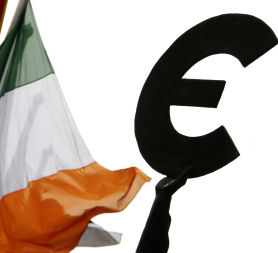Can Ireland's economy avoid Greek fate?
Updated on 28 April 2010
Greece's latest economic turmoil has led to warnings about the stability of other heavily-indebted European economies. Politicians in the Irish Republic insist they've taken firm action to keep Ireland afloat, but will it be enough, asks Dublin-based business analyst Dr Peter Stafford.

European countries have always enjoyed benchmarking themselves against their neighbouring countries when it comes to comparing economic growth, educational attainment or quality of life.
The growth of the Irish economy in the last two decades meant that the Irish Republic suddenly found itself rubbing shoulders with new neighbours in the league-table of European prosperity.
Indeed, such was the (apparent) wealth of Ireland at the height that it regularly found itself called the wealthiest and happiest country in Europe. Ireland had distanced itself from the “basket case” economies of the Mediterranean states and joined Britain, Germany and the Scandinavians at the top end of the ladder.
But like an economic game of snakes and ladders, the Irish economy crashed in 2008 and the country was forced to take its place back amongst its old neighbours of Europe.
This morning, German deputy finance minister Joerg Asmussen said that the EU must keep a particularly watchful eye on EU member states with high budget deficits and avoid allowing the most indebted states to fiddle their statistics in order to avoid penalties from Europe and the IMF.
The fear of such a development, warned Mr Asmussen, was not only that it would cripple the domestic economies of those indebted countries but it would stifle Europe-wide recovery.
There has been a growing disquiet in Dublin that when European leaders talk of countries with unacceptable deficits, it includes us.
Ireland has been praised by the European Commission for the speed at which it formulated the National Asset Management Agency (NAMA) to take over the worst debts from the banks into State control, and cut social welfare payments and public spending.
But, in terms of NAMA, at least, the impact is merely a statistical one. The NAMA debts are off balance sheet for statistical purposes and so go some way to putting distance between Ireland and Greece on the league table of European indebtedness.
Many Irish commentators are now saying that if Eurostat included all Irish debt, the IMF and others would be looking at Dublin and Athens with equal concern.
Nonetheless, while Greece looks as if it will remain firmly at the bottom of the league, with spiralling debt, no export market and little domestic activity, some more positive indicators are beginning to emerge in the domestic Irish economy.
Dublin-based stockbrokers, Davy, have suggested that Ireland returned to economic growth in the first quarter of 2010, based on an improved export market. The threat of international companies removing their European offices from Ireland also seems to have passed.
There was genuine disquiet in Dublin with Obama’s early warnings that he would incentivise US corporations to move their operations back to the US. This would have resulted in the loss of Google, Facebook, Intel and the host of other American corporations whose presence has served to keep Ireland away from the lower reaches of the European economic league table.
But signs that the Irish export market is growing and confidence that we can retain the US corporations do not mean promotion back to Scandinavian levels of wealth is inevitable.
Firstly, exporting is not a labour intensive form of economic activity, and unemployment remains frustratingly high at around 13.5%.
Secondly, the threat of a hung parliament following the British general election is having an impact on business sentiment in Ireland’s closest trading partner.
Whoever wins the election will have to cut public spending, and the Conservatives have singled out Northern Ireland as a region where the state is too big economically. This could undermine euro-sterling exchange rates and reduce spending in the Republic by our Northern cousins.
It is unlikely that Ireland will be rubbing shoulders with the Scandinavians and Germans at the top of the European wealth table again very soon.
But while the European Commission allows the Irish government to work through its indebtedness and focuses on resolving the Greek crisis, the hope in Dublin is that it is more than merely a statistical accountancy device and the profits of US corporations which keep Ireland from being bottom of the indebtedness ladder.
http://peterstafford.ie
Twitter @peterstafford

